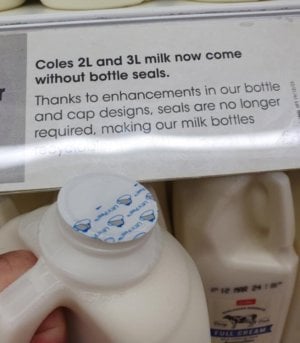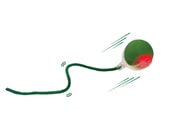Major milk makeover at Coles: See how it affects 2L and 3L sizes!
- Replies 12
Attention all Coles shoppers—there's a fresh change splashing into the dairy aisle that's bound to make your next pour a little smoother and the planet a tad happier.
For years, those tiny seals have been the sticky gatekeepers to your fresh milk, a small but notable nuisance that also contributed to plastic waste.
This move isn't just about customer convenience, it’s a significant step toward sustainability.
Coles recently announced an eco-conscious decision that will affect milk lovers across Australia: the popular 2-litre and 3-litre milk bottles are shedding their plastic seals for good.
They had taken a deep dive into their packaging practices, and decided it's time for a fresher look at how their milk packaging fits into an environmentally friendly future.
Until recently, Coles employed seals that were cumbersome for customers, requiring them to be pulled off after removing the lid from a new carton.
These seals were intended to minimise the risk of spills and leaks.

Coles implemented signages in numerous stores nationwide to inform customers about the change, which is reportedly being shown in all stores across the country.
According to a spokesperson for the supermarket, this change signifies that Coles milk cartons are now recyclable.
‘Coles is always looking for ways to reduce unnecessary plastic from circulation, and while our seals were originally used to reduce instances of leaking bottles, over time, packaging design of both the bottle and the lid have improved, and the seals are no longer required,’ the spokesperson said.
‘This decision to no longer require seals on Coles milk will see more than 10,000kg of plastic removed from circulation when this packaging change is completed nationally.’
A Coles shopper noticed the alteration, and shared a picture of signage displayed in stores, informing customers of the update.
According to 7NEWS, Coles' milk suppliers have dedicated the past year to transitioning their processing facilities to enable this modification, although not all sites have yet implemented the updated packaging.
Since not all suppliers have completed the transition, the signage in the social media post seems to have been incorrectly displayed in the given state. Coles is currently looking into the matter.
This is not the first change that Coles made in its own brand of milk this year.
Just recently, Coles lowered prices after facing criticism due to a price hike last year. You can read the full details here.
This milkshake-up is a small part of a much larger drink—one of stewardship and responsibility.
So, next time you grab that bottle of Coles milk, remember, every little change contributes to a greener future.

Are Coles' new milk bottles making a splash in your daily routine? What do you think about this packaging change? Share your thoughts with us in the comments below.
For years, those tiny seals have been the sticky gatekeepers to your fresh milk, a small but notable nuisance that also contributed to plastic waste.
This move isn't just about customer convenience, it’s a significant step toward sustainability.
Coles recently announced an eco-conscious decision that will affect milk lovers across Australia: the popular 2-litre and 3-litre milk bottles are shedding their plastic seals for good.
They had taken a deep dive into their packaging practices, and decided it's time for a fresher look at how their milk packaging fits into an environmentally friendly future.
Until recently, Coles employed seals that were cumbersome for customers, requiring them to be pulled off after removing the lid from a new carton.
These seals were intended to minimise the risk of spills and leaks.

A shopper shared a photo of a Coles milk bottle with the old seal with the Coles signage informing customers of the change in milk bottle seals in the background. Credits: X
Coles implemented signages in numerous stores nationwide to inform customers about the change, which is reportedly being shown in all stores across the country.
According to a spokesperson for the supermarket, this change signifies that Coles milk cartons are now recyclable.
‘Coles is always looking for ways to reduce unnecessary plastic from circulation, and while our seals were originally used to reduce instances of leaking bottles, over time, packaging design of both the bottle and the lid have improved, and the seals are no longer required,’ the spokesperson said.
‘This decision to no longer require seals on Coles milk will see more than 10,000kg of plastic removed from circulation when this packaging change is completed nationally.’
A Coles shopper noticed the alteration, and shared a picture of signage displayed in stores, informing customers of the update.
According to 7NEWS, Coles' milk suppliers have dedicated the past year to transitioning their processing facilities to enable this modification, although not all sites have yet implemented the updated packaging.
Since not all suppliers have completed the transition, the signage in the social media post seems to have been incorrectly displayed in the given state. Coles is currently looking into the matter.
This is not the first change that Coles made in its own brand of milk this year.
Just recently, Coles lowered prices after facing criticism due to a price hike last year. You can read the full details here.
This milkshake-up is a small part of a much larger drink—one of stewardship and responsibility.
So, next time you grab that bottle of Coles milk, remember, every little change contributes to a greener future.
Key Takeaways
- Coles is phasing out the use of plastic bottle seals on its own brand 2L and 3L milk cartons to reduce unnecessary plastic waste.
- The removal of the seals came after improvements in packaging design, which made the seals redundant for preventing leaks.
- More than 10,000kg of plastic is expected to be removed from circulation once the change is fully implemented nationally.
- While Coles is rolling out this change across the country, the transition is ongoing and not all milk suppliers have updated their packaging yet.
Are Coles' new milk bottles making a splash in your daily routine? What do you think about this packaging change? Share your thoughts with us in the comments below.







